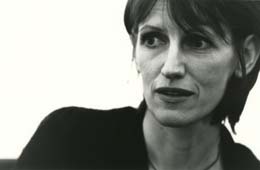
Dietlind Antretter
- Austria
- Zu Gast beim ilb: 2006
Dietlind Antretter was born in 1961 in the Austrian city of Salzburg. After attending grammar school she began studying German Language and Literature in her home city, during which time she was already working as a journalist and in a theatre. At the same time she was employed in the press office of the Salzburg Festival, was a trainee of George Tabori at the Munich Kammerspiele and was taken on by the Salzburg State Theatre. Regular visits to France resulted in her moving to Paris, where she completed a traineeship at Jean-Louis Barrault’s Theatre, and worked at the Comédie Française and the Théâtre de l’Odéon. After receiving a doctorate she carried out assignments for the ORF in Vienna in 1988 and eventually settled in Paris. Here she was engaged as an assistant director, executive producer, co-director and dramatic advisor. In 1996 she moved to California and worked as a freelance author and journalist for, for example, the “Salzburger Nachrichten” and NDR, for which she made radio programmes dealing with Sandor Marais’s last exile in San Diego or William Faulkner’s work in Hollywood. She wrote a new version of “The Abduction from the Seraglio” for the Salzburg Festival, which was performed in 1997 and 1998.
Life in different countries is also a central topos of the eight short stories which make up her literary début “Immer wie immer” (2005; t: Always as always). Here, Antretter’s floating prose displays a unique tension through its calculated sketchiness. Just as is the case with the author herself, the protagonists are products of the artist and theatre scene, and the settings are often places where Antretter herself has worked. In the first and longest story “Es scheint so” (t: It appears so) Antretter grants the reader an authentic insight into the milieu of established theatre, whose extroverted yet vulnerable main figures indulge in ceaseless hedonism in their search for human warmth. In this way Irina, Marcel, Christelle, Jeremy and Beatrice mutually betray their spouses and partners; mostly, however, they betray themselves. Although labelled in the subheading as “love stories”, the other stories deal rather with the desire for love, often unsuccessful endeavours towards affection or the evanescence of love. In the second story the characters seem capable only of loving their dogs and totally unable to operate in relationships between people.
The author is the mother of twins and lives in southern California, southern France “and sometimes in Prague”.
© internationales literaturfestival berlin
Immer wie immer
Haymon
Innsbruck, Wien, 2005
